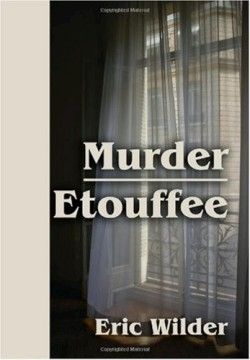
Murder Etouffee
Like a cold intoxicating hurricane slush on a hot summer day one can down Wilder’s Murder Etouffee in one sitting with all the exuberance of a tourist thirsty for the excitement of “Nawlins.” Oftentimes though a reader may devour shorter titles (Etouffee clocks in around 176 pages in hardcover) yet tend to forget the heart of the story. Here though it is certain Etouffee will have a lasting impact on all of the senses a book perhaps to prompt musings over a New Orleans style dinner. A few bites of Etouffee may have a reader pondering how Bertram might have cooked it. The answer of course is in the roux.
Wilder is not a New Orleans native nor does he presently live in the city. This is a fact well documented in the book’s introduction along with his lifelong admiration for the city a desire to immortalize in his own unique way what many authors and artists had done before him. In Etouffee Wilder’s third book he seeks to offer the uninitiated a sampling of spicy flavors — aromatic recipes dashed with a bit of humor; intriguing history one doesn’t find in textbooks; and short fiction alive with engaging characters and suspense. Some characters allude to another work of Wilder’s a novel called Big Easy starring the aforementioned Bertram Picou master of the roux.
Of all the entries in Etouffee — the regional recipes the editorials (including timely pieces which touch upon the Katrina aftermath and city reconstruction) and the “lagniappes” (Louisiana-French for “gift” Wilder offers slices of local lore spicier than any crawfish pie) — it is the short stories where Wilder’s talent best shines.
The book’s title story touches upon race relations in New Orleans in particular the pride attached to one’s heritage and how secrets can prove to be deadly. “Possession” delves into the darker side of the city; it is a brief yet vivid tale of voodoo and decadence. “Conjure Man” is a winner for its bold characterization of Mama Mulate an educated practitioner of voodoo charged with solving a missing persons quest. Engaging dialogue and an overall mysterious atmosphere drapes the tale in a suspenseful aura. One hopes Wilder will expand on the Mulate character in future stories.
The only wish for Etouffee would have been to see more fiction in place of the commentary and essays. As informative as Wilder’s observations of local history are Murder Etouffee might have benefited more from fictionalized tales based upon the topics of each essay — a post-Katrina fiction a story of the legendary voodoo queen Marie Laveau — because fiction is truly where Wilder’s strength lies.
Disclosure: This article is not an endorsement, but a review. The publisher of this book provided free copies of the book and paid a small fee to have their book reviewed by a professional reviewer. Foreword Reviews and Clarion Reviews make no guarantee that the publisher will receive a positive review. Foreword Magazine, Inc. is disclosing this in accordance with the Federal Trade Commission’s 16 CFR, Part 255.
